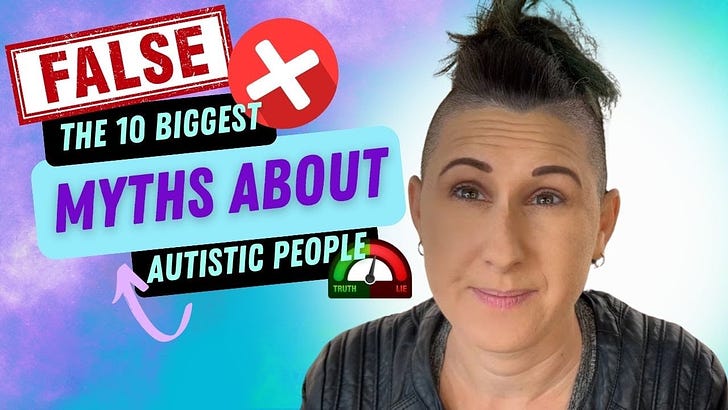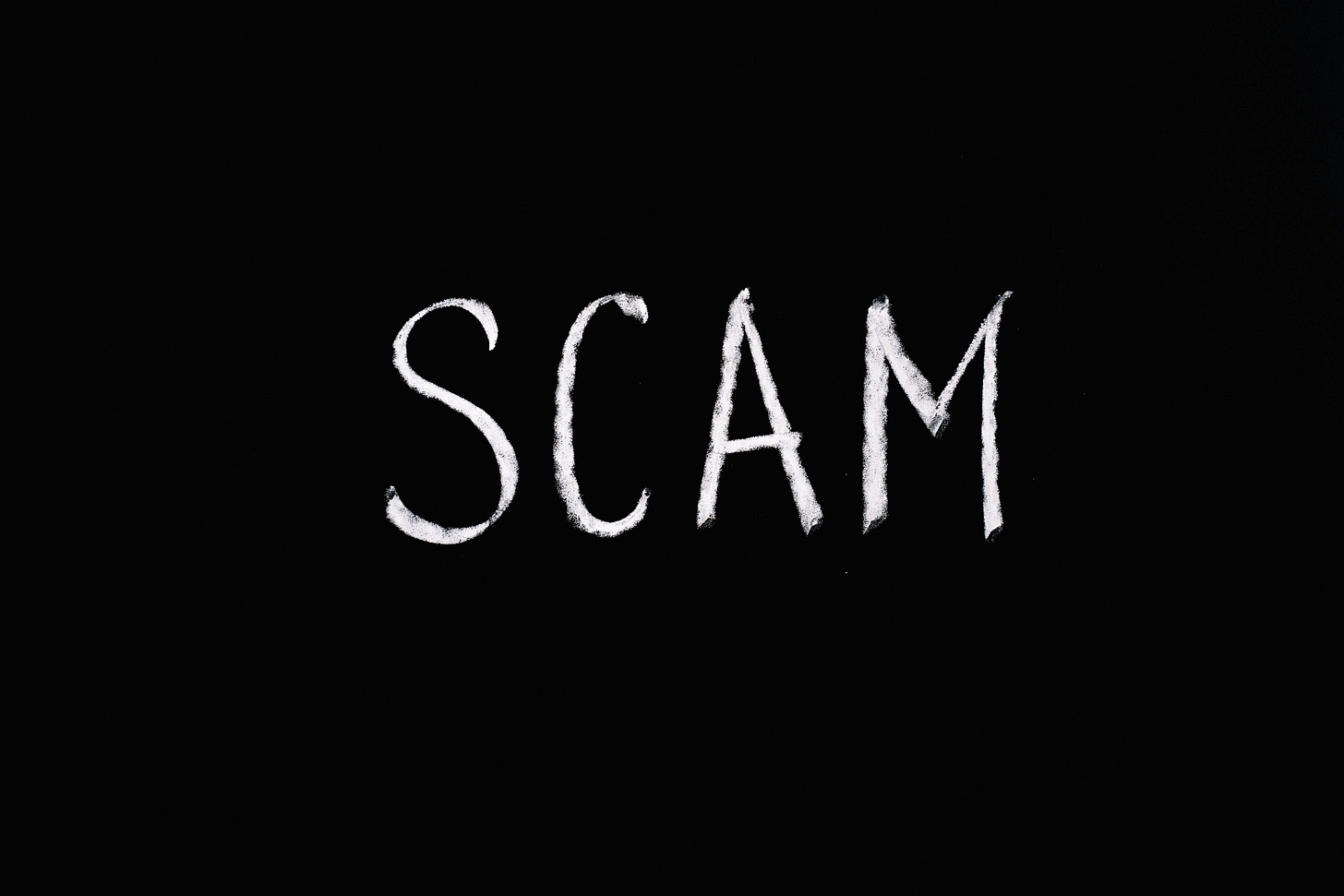10 Things People Get Wrong About Autism and Autistic People
Beyond Stereotypes: Setting the record straight. Dispelling Misconceptions and Promoting Empathy for Autistic People.
The video below was shared with my Paid Substack Subscribers about one week before it’s general public release as a thanks for their support.
ID: Lyric, a pale-skinned nonbinary person with black hair with dark green ends and shaved sides is sitting in the corner of an RV with tan Accordion window shades on either side of them. They wear grey T-shirts and black leather jackets with their hair pulled back.
1. MYTH: Autism is caused by poor parenting (or vaccines, toxins, diet, nutrition, or screen time).
Autism is a life-long neurological processing difference (meaning we're born Autistic and we die Autistic) that is NOT caused by external factors of lifestyle choices.
Research has consistently shown that Autism is largely genetic, with brain structure and functioning differences present from early development.
The myth that vaccines cause Autism originated from a retracted and discredited study that has been debunked numerous times.
2. MYTH: All Autistic People are introverts who hate socializing.
The myth that all Autistic People are introverts who hate socializing is a harmful and inaccurate stereotype. Autistics are just as diverse as non-autistic people are in this respect.
While I fit this stereotype more than most (as an Autistic Person who prefers quiet, more solitary environments most of the time), even I crave social interactions and enjoy being around other people from time to time.
I prefer to socialize in smaller, more intimate settings - in one-to-one or groups of four people or less (anything else becomes overwhelming to me).
Even the most introverted Autistic People may yearn for meaningful social connections. Many Autistic People desire time around other people, and some Autistic People even consider themselves to be extroverted.

3. MYTH: The Autistic brain type is rare.
According to the most recent report by the CDC, 1 in 36 children have been identified as Autistic.
Additionally, the CDC Data we use to determine Autism prevalence historically has always focused on children, meaning late identified Autistic People and Autistic adults aren't even considered in the data.
This also doesn't account for the families who won't allow Autism screenings (due to cultural differences) and underprivileged kids (who may have less access to medical care and are often left out of screenings).
Less marginalized Autistics, especially those who are cis, straight, white, male, and financially privileged (who have better access to healthcare and are more likely to be taken seriously by their medical providers), are more likely to be seen as Autistic. While those of us who are less privileged will have our Autism seen as other things (mine was labeled "bad behavior" when I was growing up).
If we come from families who don't have as many resources, we are more likely to slip through the cracks, being diagnosed in adulthood (if we are even diagnosed at all).
Because of this (and a few other factors), I suspect the actual number of Autistic People is even higher than 1 in 36.
4. MYTH: Autism is only found/diagnosed in young boys and children.
Truth: I am a nonbinary human who was diagnosed Autistic as an adult at the age of 29.
Though our diagnostic criteria and many medical providers have biases towards young, white boys (and Autism used to be considered a little boy's condition by many), we now know Autistic people come from all ages, genders, races, and orientations.
5. MYTH: Autistic People don't experience feelings or empathy for others.
Empathy is a spectrum, and Autistic People can be found in all places along that spectrum (just like non-autistic people can be).
Some Autistic People have overwhelming hyper-empathy and emotional experiences. In contrast, other Autistic People have much lower, lesser levels of empathy and lower emotional experiences (and there's nothing wrong with that).
Sometimes, I have so much empathy it physically hurts or makes me feel sick - this is one reason I can't watch movies and TV where people or animals are being beaten up, injured, or having medical procedures done to them (even though it is acting) - because I feel their pain as if it were my own.
We may express our empathy differently, but that doesn't mean our empathy is less valid than any other type of empathy other people experience.
When I feel too much, I can shut down, which makes it look like I am cold and uncaring, but in reality, I care so much that I can become bogged down by all the feelings welling up in me at once.
More on hyper-empathy in THIS POST.
It can be harder to empathize with experiences you don't have (and needs you do not understand) regardless of one's NeuroType. This is where the double empathy problem (and the confusion between cross-neurotype communication can cause trouble) comes in.
More info about the double empathy problem is in THIS POST.
I feel lots of empathy, often for people who fail to show me the same compassion and grace I give them.
I'm reasonably good at understanding other Autistic People (and how they will perceive my actions and thoughts); however, I DO struggle to know how non-autistic people will interpret and perceive me (as they struggle to understand how an Autistic Person will interpret their actions).
Non-autistic people are just as bad at (if not worse at) understanding Autistic People as we can be at understanding them, with one exception - Autistic People are often EXPECTED to learn to understand and speak the non-autistic language. At the same time, non-autistics don't have the same pressure to comprehend how Autistics communicate.
Paid subscribers have access to more of this story as a thanks for supporting my work.
ID: Lyric, a pale-skinned nonbinary person with black hair with dark green ends and shaved sides is sitting in the corner of an RV with tan Accordion window shades on either side of them. They wear grey T-shirts and black leather jackets with their hair pulled back.
Substack Subscribers, Patreon members, and YouTube channel members had access to this video on Wednesday, March 27, 2024. The video’s public release will be on Tuesday, April 2, 2024, for World Autism Day.
6. MYTH: Autistic individuals are clumsy and uncoordinated.
I am, but that doesn’t mean ALL Autistic People are.
Autistic People often have spiky skills and ability profiles. We are also known for having communication, sensory, and muscle control differences (where we can be hyper or hypo-sensitive in our various sensory and motor areas).
While some Autistic people are clumsy, many are athletic and coordinated. As Autistic People, we may have enhanced or reduced motor control.
Because we often experience our senses in extremes, Autistic People can have reduced or enhanced movement planning and awareness of bodily position (as with Clay Marzo, the surfer, and Armani Williams, the Autistic NASCAR driver).
If we fall into the extreme of enhanced motor control, we may be in line with top athletes (such as those mentioned above and many more).
In contrast, if we have reduced motor function and control, we may struggle or need help with day-to-day tasks that many people take for granted (such as opening packages, putting on clothing or makeup, feeding ourselves, walking, or driving).

7. MYTH: Autistic People can't understand sarcasm or humor.
There's a rumor that Autistic People don't use (or cannot understand) humor and sarcasm. However, most Autistic People I know have a GREAT sense of humor. I also know many sarcastic Autistic People.
While some Autistic People may struggle with sarcasm and certain types of humor (because of all those little subtle cues and nonverbal signals often involved in sarcastic comments), some Autistic People speak fluent sarcasm. This is just one more way Autism is a SPECTRUM, with various experiences.
My personal struggles with sarcasm come from the fact that I am a very straightforward, upfront, and literal type of thinker, which impacts how I communicate outwardly (as well as how I interpret communication coming in).
Something else that impacts whether or not I am likely to pick up on if someone is using sarcasm (or other forms of humorous speech) is how well I know the person (or not).
If I have the opportunity to get to know a person (and their patterns and habits), all kinds of social situations can be made easier between us (because that person becomes more predictable to me).
When I know someone is a very sarcastic (or humorous and playful) human being, I can be mentally prepared for loads and loads of sarcasm, humor, or jokes, making it more likely I will pick up on the sarcasm.
Another instance where I struggle with sarcasm is when people use sarcasm in written text (and they don't use emojis or other marks to notate their sarcastic tone).
If you are being sarcastic with me in writing, PLEASE use some winky face, LOL face, or notate your sarcasm.
Now, let's touch on the "humor" part of this myth:
Autistic People are funny (even if non-autistic people don't get our jokes). For example, there are also Autistic standup comedians (like Hannah Gadsby) who can make audiences of all NeuroTypes laugh out loud.
Autistic and other forms of NeuroDivergent humor and sarcasm are different from non-autistic humor and sarcasm (because our brains are measurably different from non-autistic brains, influencing our experience of the world and even our senses of humor).
Like everyone, I read tone based on my personal life experience and ways of interpreting information.
There are some types of humor commonly and widely accepted by NeuroTypical society that I, as an Autistic Person, don't find funny (and vice versa).
Just because we have different senses of humor and find other things funny, it doesn't mean one way is better. It suggests we have different lived experiences that make it harder for us to relate to one another. This can be true for people regardless of NeuroType (since no two people will have the same experiences and ideas).
More about Autistic Humor and Sarcasm in THIS POST.
8. MYTH: Autistic People can't live fulfilling lives.
Like everyone else, Autistic People have strengths, passions, hobbies, and interests that can help us make meaningful connections with (and contributions to) society.
If we are provided the correct supports (accommodations) and are affirmed and accepted, we can thrive in various aspects of our lives:
Education: learning about topics they are passionate about
Hobbies & Interests: engaging in activities that bring us joy and enrich our lives
Relationships: building deep connections with family, friends, partners, and loved ones
Community Involvement: be part of a community, giving back, doing volunteer work, advocacy, or other activities
Careers: finding employment that we find fulfilling and enjoyable (that leverages our interests and strengths)
Additionally, Autistic and NeuroDivergent success (and thriving in life) may look very different from what a non-autistic, NeuroTypical person's version of success looks like.
It is crucial to recognize that there are Autistic individuals who may require additional support and accommodations to thrive. Factors like individual needs, co-occurring conditions, and life events can impact the level of individualized support needed.
Needing support doesn't diminish an Autistic Person's potential to live a fulfilling life. By acknowledging and respecting individual differences and needs, we can create a more inclusive and supportive environment that allows Autistic People to thrive and live their best lives (not the lives people around us think we should live).
9. MYTH: Autistic People can't understand or feel emotions.
Just like anyone, Autistic People experience a range of emotions.
Something that many Autistic People struggle with is having a more intense experience of the world around us - a world that can be hostile and unforgiving for sensitive souls who feel things deeply.
My sensory experience is more intense than many people I know. Things most people find minor annoyances (if noteworthy), like fluorescent lighting, can be physically painful to me (and can make me sick). In addition to a more intense sensory experience, I experience my emotions intensely and fight with " Big Feelings" frequently.
When I didn't know I was Autistic, I didn't know WHY I had these "Big Feelings." I felt a great deal of shame over them.
Knowing I'm Autistic has helped me understand where these "Big Feelings" come from and how to manage them when they arise.
My Autistic brain, combined with how the world can be very uncomfortable for me (and how many times I've been encouraged to ignore my own needs and discomfort), means I struggle to know how I'm feeling from moment to moment.
Sometimes, I experience an emotion, and I may not know what that emotion is at that moment. I may not figure that emotion out until minutes, hours, days, and even years later when I process it (because I often process things, including my feelings) on a delay (ESPECIALLY if those emotions are overwhelming and cause me to shut down).
The alternative for expressing those big feelings is disconnecting from them and shutting down (something I do automatically when the emotions are too much or if I feel unsafe).
These shutdowns can make me appear "emotionless" when, in reality, I've experienced so many emotions I've overloaded and disassociated from the overwhelm of those feelings. Initially, I may appear fine at the moment, seeming blank, cold, detached, and emotionless. However, I will likely crash and collapse in a gooey puddle of overwhelming emotions, only to fall apart days, weeks, or months after the fact (when I finally process my feelings)... OR I may fall apart instantly over something "small."
My emotional reaction often seems too much or too little for the situation.
I'm not trying to be complicated. I'm attempting to express myself authentically, but I need time, space, and compassion from those around me. Otherwise, I will have to keep removing myself and shutting down when big feelings arise instead of seeking support when I need help.
More info about Big Feelings in THIS POST.
10. MYTH: Autism needs a cure.
The idea of a "cure" implies that there is something inherently wrong or broken that needs to be fixed in us (an implication that places a negative stigma upon Autistic People).
Autism is not a disease or a disorder that needs to be cured. It is a neurological difference that affects how individual Autistic People perceive and process information.
As Autistic People, we have our own strengths, challenges, and experiences. Just because our minds work differently doesn't mean we are broken, or something is inherently WRONG with us.
Instead of focusing on a cure, it is vital to promote acceptance and understanding of Autistic people, as well as providing us with the support and accommodations we need to reach our full potential.
It also means challenging the neuro-normative standards of society and the ableism that harms Autistic people and working to create a culture that values and celebrates us.
By shifting the focus from "cure" to acceptance and appreciation, we can create a more inclusive and accepting world for all of us.
What would you like to learn about?
Please, let me know in the comments below what questions you have or if you have another idea/topic you're curious about for a future article.







If vaccines cause autism, then why was my mother autistic too -- and *she* was born in 1931, well before the widespread use of childhood vaccines? (See episode 5 of "Was It Autism All Along?" on YT)